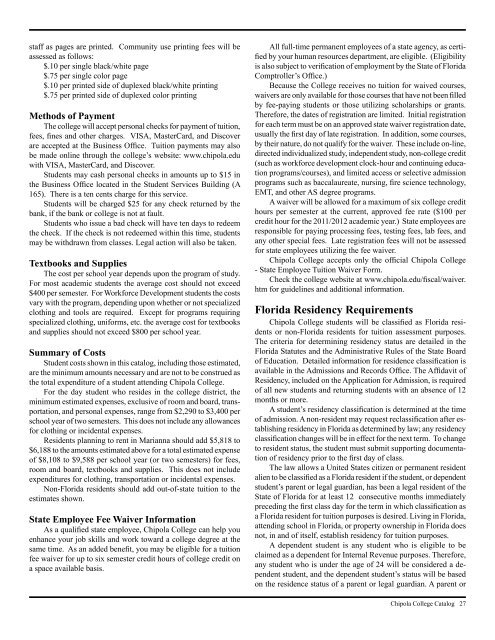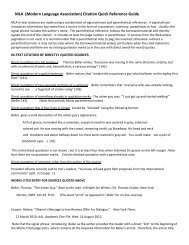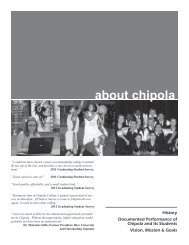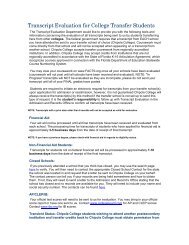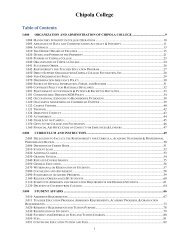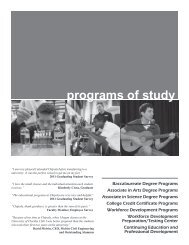2011-12 Catalog - Chipola College
2011-12 Catalog - Chipola College
2011-12 Catalog - Chipola College
You also want an ePaper? Increase the reach of your titles
YUMPU automatically turns print PDFs into web optimized ePapers that Google loves.
staff as pages are printed. Community use printing fees will be<br />
assessed as follows:<br />
$.10 per single black/white page<br />
$.75 per single color page<br />
$.10 per printed side of duplexed black/white printing<br />
$.75 per printed side of duplexed color printing<br />
Methods of Payment<br />
The college will accept personal checks for payment of tuition,<br />
fees, fines and other charges. VISA, MasterCard, and Discover<br />
are accepted at the Business Office. Tuition payments may also<br />
be made online through the college’s website: www.chipola.edu<br />
with VISA, MasterCard, and Discover.<br />
Students may cash personal checks in amounts up to $15 in<br />
the Business Office located in the Student Services Building (A<br />
165). There is a ten cents charge for this service.<br />
Students will be charged $25 for any check returned by the<br />
bank, if the bank or college is not at fault.<br />
Students who issue a bad check will have ten days to redeem<br />
the check. If the check is not redeemed within this time, students<br />
may be withdrawn from classes. Legal action will also be taken.<br />
Textbooks and Supplies<br />
The cost per school year depends upon the program of study.<br />
For most academic students the average cost should not exceed<br />
$400 per semester. For Workforce Development students the costs<br />
vary with the program, depending upon whether or not specialized<br />
clothing and tools are required. Except for programs requiring<br />
specialized clothing, uniforms, etc. the average cost for textbooks<br />
and supplies should not exceed $800 per school year.<br />
Summary of Costs<br />
Student costs shown in this catalog, including those estimated,<br />
are the minimum amounts necessary and are not to be construed as<br />
the total expenditure of a student attending <strong>Chipola</strong> <strong>College</strong>.<br />
For the day student who resides in the college district, the<br />
minimum estimated expenses, exclusive of room and board, transportation,<br />
and personal expenses, range from $2,290 to $3,400 per<br />
school year of two semesters. This does not include any allowances<br />
for clothing or incidental expenses.<br />
Residents planning to rent in Marianna should add $5,818 to<br />
$6,188 to the amounts estimated above for a total estimated expense<br />
of $8,108 to $9,588 per school year (or two semesters) for fees,<br />
room and board, textbooks and supplies. This does not include<br />
expenditures for clothing, transportation or incidental expenses.<br />
Non-Florida residents should add out-of-state tuition to the<br />
estimates shown.<br />
State Employee Fee Waiver Information<br />
As a qualified state employee, <strong>Chipola</strong> <strong>College</strong> can help you<br />
enhance your job skills and work toward a college degree at the<br />
same time. As an added benefit, you may be eligible for a tuition<br />
fee waiver for up to six semester credit hours of college credit on<br />
a space available basis.<br />
All full-time permanent employees of a state agency, as certified<br />
by your human resources department, are eligible. (Eligibility<br />
is also subject to verification of employment by the State of Florida<br />
Comptroller’s Office.)<br />
Because the <strong>College</strong> receives no tuition for waived courses,<br />
waivers are only available for those courses that have not been filled<br />
by fee-paying students or those utilizing scholarships or grants.<br />
Therefore, the dates of registration are limited. Initial registration<br />
for each term must be on an approved state waiver registration date,<br />
usually the first day of late registration. In addition, some courses,<br />
by their nature, do not qualify for the waiver. These include on-line,<br />
directed individualized study, independent study, non-college credit<br />
(such as workforce development clock-hour and continuing education<br />
programs/courses), and limited access or selective admission<br />
programs such as baccalaureate, nursing, fire science technology,<br />
EMT, and other AS degree programs.<br />
A waiver will be allowed for a maximum of six college credit<br />
hours per semester at the current, approved fee rate ($100 per<br />
credit hour for the <strong>2011</strong>/20<strong>12</strong> academic year.) State employees are<br />
responsible for paying processing fees, testing fees, lab fees, and<br />
any other special fees. Late registration fees will not be assessed<br />
for state employees utilizing the fee waiver.<br />
<strong>Chipola</strong> <strong>College</strong> accepts only the official <strong>Chipola</strong> <strong>College</strong><br />
- State Employee Tuition Waiver Form.<br />
Check the college website at www.chipola.edu/fiscal/waiver.<br />
htm for guidelines and additional information.<br />
Florida Residency Requirements<br />
<strong>Chipola</strong> <strong>College</strong> students will be classified as Florida residents<br />
or non-Florida residents for tuition assessment purposes.<br />
The criteria for determining residency status are detailed in the<br />
Florida Statutes and the Administrative Rules of the State Board<br />
of Education. Detailed information for residence classification is<br />
available in the Admissions and Records Office. The Affidavit of<br />
Residency, included on the Application for Admission, is required<br />
of all new students and returning students with an absence of <strong>12</strong><br />
months or more.<br />
A student’s residency classification is determined at the time<br />
of admission. A non-resident may request reclassification after establishing<br />
residency in Florida as determined by law; any residency<br />
classification changes will be in effect for the next term. To change<br />
to resident status, the student must submit supporting documentation<br />
of residency prior to the first day of class.<br />
The law allows a United States citizen or permanent resident<br />
alien to be classified as a Florida resident if the student, or dependent<br />
student’s parent or legal guardian, has been a legal resident of the<br />
State of Florida for at least <strong>12</strong> consecutive months immediately<br />
preceding the first class day for the term in which classification as<br />
a Florida resident for tuition purposes is desired. Living in Florida,<br />
attending school in Florida, or property ownership in Florida does<br />
not, in and of itself, establish residency for tuition purposes.<br />
A dependent student is any student who is eligible to be<br />
claimed as a dependent for Internal Revenue purposes. Therefore,<br />
any student who is under the age of 24 will be considered a dependent<br />
student, and the dependent student’s status will be based<br />
on the residence status of a parent or legal guardian. A parent or<br />
<strong>Chipola</strong> <strong>College</strong> <strong>Catalog</strong> 27


